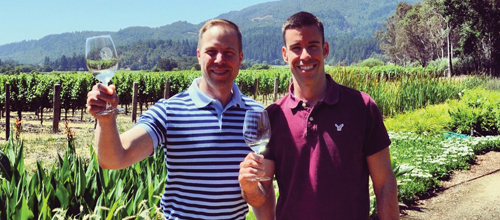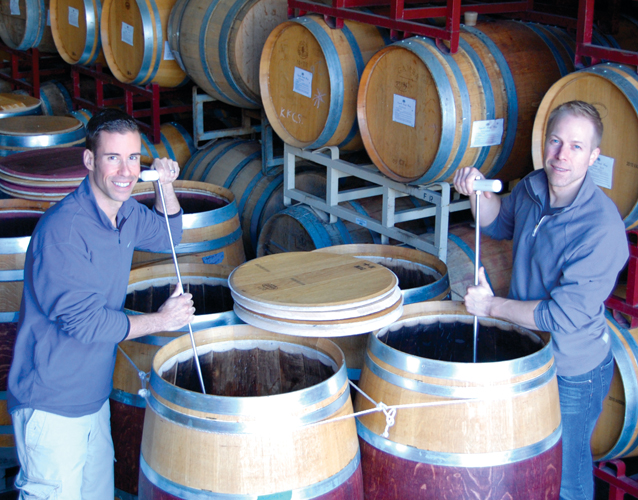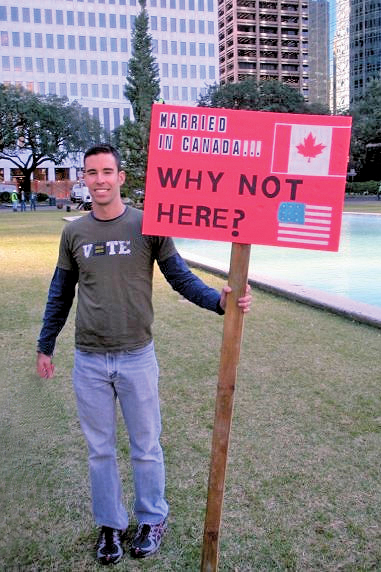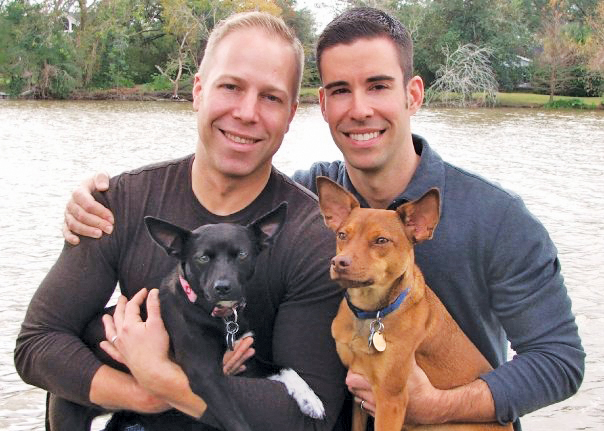
Nice Guys Do Finish First

Ian Eastveld and Ryan Levy know that ‘every wine is in its own time.’
by Brandon Wolf
On a sultry August night in Houston, two gay men, Ryan Levy and Ian Eastveld, each decided to spend an evening at Rich’s nightclub. It was 1996, and they were both twenty-one years old.
“It was only my second visit to Rich’s,” says Eastveld. “The first time was with my former girlfriend.” The straight friends he was with assumed he was heterosexual. Levy, on the other hand, was there for a gay night of dancing and revelry.
“I was on the dance floor and someone bumped into me from behind,” Eastveld remembers. “So I moved two steps to make more room. Then he bumped into me again.” After a few more bumps, Eastveld figured this was not accidental. He turned around and started dancing with Levy.
Soon they were kissing on the dance floor. “My friends were rather startled when they saw me making out and dancing with a man,” Eastveld grins.
The two left Rich’s together that night, and they have been inseparable ever since. They are now in their eighteenth year together.
Handsome and athletic, they could be poster boys for gay marriage. Their affection and mutual respect is obvious, and they mesh seamlessly when together. Recently, they were interviewed for an upcoming book about successful gay relationships.
In addition to being hardworking civil-rights activists, they own and run The Nice Winery, an ever-expanding Houston business. Nice guys, it appears, can finish first.

The Early Years
Ryan Levy was born in Houston in 1975 and grew up in Missouri City. His mother taught second grade, and his father was a chemical salesman. When he was four, a sister was added to the family.
In high school, Levy was a member of the swim team and captain of the debate team. He was a good student—among the top five in a class of eight hundred. His academic achievement earned him a $12,000 scholarship from the Houston Livestock Show and Rodeo. “Ann Richards presented me with the check,” he remembers.
Levy entered Rice University in 1993, eventually gravitating to political science and heading the Student Government Program Committee. Although he wasn’t out yet, he did support the gay student organization’s request for a National Coming Out Day speaker. “It was controversial,” he remembers.
Ian Eastveld was born in 1975 in Montréal. His father sold real estate, and his mother had been an Air Canada stewardess before retiring to raise her three children. In 1978, Eastveld’s father decided the Houston real estate scene was the place to be, and the family settled in the Klein area.
During his early school years, Eastveld’s father wanted him to play soccer. He did, but his heart wasn’t in it. “I preferred to come home and watch Julia Child and other cooking shows.” In high school, he was a member of the marching band.
Eastveld enrolled at TCU in Ft. Worth to study pre-med, but soon transferred to Texas Tech in Lubbock, majoring in finance. “I never liked school that much,” he admits.
Long-Distance Romance
After Levy and Eastveld met at Rich’s, they spent an entire week together. Then reality hit with a dull thud as they prepared to leave for their senior years at separate colleges. Airports quickly became familiar—and sad—places for them.
Both men graduated in 1997. Levy moved to Austin to attend the UT law school. Eastveld continued to live in Houston, working for his father in real estate.
During his years at UT, Levy’s passion for activism bloomed, and he started a student chapter of the Human Rights Campaign (HRC). The HRC doesn’t
have student chapters, so the group wasn’t officially recognized—but Levy was happy to have an anchor for his focus on LGBT rights.
By 1998, Eastveld had joined Levy in Austin and began teaching cooking classes at Central Market. He was soon asked to serve as the prep cook for several master chefs. “It was the perfect way to learn,” he says.
Moving to Dallas
In 2000, Levy received his law degree. He was offered a job at a Dallas law firm, and accepted. But before starting his new job, the couple did something that would profoundly impact the course of their lives. They registered for a pastry course at the Cordon Bleu Culinary School in Paris. “It was a year’s work packed into two months, 7 a.m. to 7 p.m., six days a week,” says Levy.
During that summer of 2000, the men lived in a tiny Paris flat above a bakery, cheese house, and small wine shop. After the long days at school, they bought baguettes and hunks of cheese and went to see a man named Claude in the wine shop. “He never failed to pair the perfect wine with our afternoon snack,” Levy says. Years later, the two men would teach others what Claude had taught them.
Back in Dallas, Levy became a trial lawyer, doing litigation work. At the same time, Eastveld started his own catering firm, which he called Nuance. Levy helped with the catering business on the weekends while doing volunteer work for the HRC and Lambda Legal organizations.
Eventually, they partnered with a friend who owned a bar, preparing appetizers for the patrons. That evolved into a small restaurant at the site named Republic, which specialized in small tapas dishes inspired by international French cuisine that has evolved in France’s former colonies.

Why not Here?: Ryan Levy at a Prop 8 rally in Houston in 2008.
The Magic of Marriage
In 2004, the two men traveled to Montréal, where gay marriage had recently been legalized.
Both sets of parents attended the ceremony. “Marriage was important to them—it was an institution they could identify with,” Levy explains. It was an amazing process of coming full circle for the parents. Levy says that when he came out years before, his mother’s first words were, “You will die of AIDS.” His father said he was committing social and career suicide. Eastveld’s parents had always liked Levy, but had no idea the men were lovers. “They wanted me to marry one of their daughters,” Levy says. He did indeed become their son-in-law—just not the way they had planned.
Levy’s parents didn’t travel much, so the trip to Montréal was their own “coming out” as parents of a gay son. When friends asked why they were making the trip, they proudly said, “So that we can see our sons get married.”
Levy’s friends in Houston also wanted to celebrate this union with the couple, so in 2005, the men had a commitment ceremony here. Since Levy’s family is Jewish, a cantor performed the rites and a Jewish wedding document signed by the cantor now hangs on their wall.
“The Nice Winery” Is Born
By 2005, Levy had tired of the legal field and resigned. He and Eastveld put their belongings in storage and traveled for a while, ending up in California. Eastveld had become interested in fine winemaking and began studying to become a certified sommelier. It took two years to complete the training.
Eastveld completed his studies, took the exam, and earned his pin. The test is extremely challenging, with barely a 50-percent passing rate. Along the way, Levy was learning about winemaking from Eastveld. Levy decided to take the exam too, and agreed that if he passed it, he would give up his legal career and devote himself to running a winery.
Levy passed the test and readied himself for a new life. The men bought a home in Houston in 2006, and Eastveld leased a vineyard in Napa Valley.
The couple settled down in Houston in 2007 to start The Nice Winery. While that name might sound like something grabbed out of thin air in order to quickly incorporate a business venture, it actually has a sentimental family meaning. Eastveld’s mother had picked up on the first letters of her children’s names—“N” for Natalie, “I” for Ian, and “C” for Cindy. Adding “E” for Eastveld, she ended up with “NICE.” “She used it for monograms on towels,” Eastveld remembers. She suggested the acronym for the winery, and, to their surprise, no one had a prior trademark claim on the word.
In 2007, the men traveled to Argentina and started investigating vineyards. They finally found one, and convinced the owners to lease part of their land, harvest the crop, and process it for them.
Now the men had a wine business, two successful 2007 crops, and lots of barreled wine. But it would be three more years before they could begin to market it. In 2008, 2009, and 2010, there were similarly successful harvests from their Napa and Argentina vineyards. “We kept tasting it, but knew it wasn’t right yet—‘Every wine is in its own time,’” says Levy.
Waiting for the Wine
For three years, the new wine merchants could only wait. “We were certified chefs, members of the Court of Sommeliers, and had three harvests of wine aging in barrels,” says Levy. “The one thing we didn’t have yet was a product.”
Meanwhile, a group of their friends persuaded Eastveld and Levy to start a buffet dinner club that would feature two new wines each month. Those Paris afternoons with Claude were soon yielding an unexpected dividend.
“We taught them how to decant, the temperature for serving, the breath of the wine, the aroma, the taste, the age, the geography, and how to pair it with food dishes—basically everything we knew about wines,” says Levy. The venture started with a cozy group of twelve friends. But word got around, and the club grew to an unbelievable five hundred members. “That put an end to the small dinners.” Levy says.
Also during that time, the Houston chapter of the Human Rights Campaign was begging for volunteers to help. Levy agreed to co-chair the Federal Club, which raises funds by asking donors to commit to $100 each month. Eastveld became co-chairman of the annual dinner.
https://www.youtube.com/watch?v=nP-g5FDk7Pk&sns=em%20%5D
The men gave each of their parents a basic membership in HRC, and they began to receive Action Alerts. Levy’s mother decided to write Senator Kay Bailey Hutchison and ask her to vote for gay marriage. Hutchison responded with a letter saying that she was going to vote against the issue in order to “save the country from the threat of same-sex marriage.”
In 2007, Levy’s parents asked if they could address the annual HRC dinner. The audience heard Levy’s mother talk about the joy of her son’s commitment ceremony, and she also read the senator’s response to her plea.
The HRC’s goal for that evening was thirty new members. After Levy’s parents spoke, one hundred people signed up, shattering previous HRC recruiting records.

An Ever-Expanding Business
In 2010, the first crop of wine had finally aged to the couple’s satisfaction, and the men began to market it. “It was like giving birth,” Levy sighs.
The Nice Winery now operates in west Houston, and they sell their wines online, set up tasting tables in area supermarkets, and personally market them to Houston’s finest restaurants. Additionally, they offer classes in winemaking and tours of wineries. They have also started a Friday night event in their facility, serving wines and appetizers.
The men have partnered with a friend to harvest a third annual crop from their Cypress vineyard. “It’s a very hardy, native grape that does well in this climate,” Levy explains.
Although they are already legally married, they look forward to the day when the Lone Star State recognizes their relationship. “When they do, we’re going to have that date inscribed on the inside of our wedding bands,” Levy says. No doubt, they will also toast the occasion with glasses of Nice wine.
Brandon Wolf wrote about the Montrose Diner in the November issue of OutSmart.











Comments